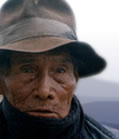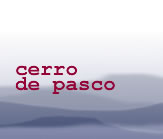Ana is from a mining and farming family in the community of Tarmatambo. She is an articulate independent woman, educated to secondary level with a history of trade union work, particularly with mining women. She is married to a union leader, they have three children.
She gives insights into the changes in workers’ conditions in the mining industry from her grandfather's day to now, linked to the level of union organisation and government policy. She gives examples of poor conditions and the impact on the health of miners. Ana refers to the difference between trade union popular organisations born out of felt needs and struggle and more recent organisations (possibly government sponsored) eg the Vaso de Leche (literally, Glass of Milk: welfare organisation aiming to ensure all children receive milk daily).
She gives an interesting account of changing gender relations: illustrated by her own development and through her parents’ arranged marriage, when women were excluded from the transaction, and her own, where she had some say in the matter. She makes several references to the important role of women in farming, past and present. Men work in the mines or in Lima and women assume all responsibility for running the farm and looking after the children.
Community ties and rituals are important for social cohesion. They induce men to return regularly to their families, though the early conditions in the mines and her grandfather's story illustrate the way this system can fail. Orphaned children are brought up by relations in the community.
|
You will need a password from Panos to view the full
transcript of the interview. To apply for a password, click here.
Once you have a password, click here to go to the beginning
of the transcript. You can also click on any section of the
breakdown of content below and go straight to the
corresponding part of the transcript.
|
| Section 1 |
Grandfather and father worked in mining. Family from Tarmatambo campesino community. Father went into mining as couldn't earn enough from farming.
|
| Section 2 |
Grandmother was the farmer, she died when her father was young and left her animals to the men to raise.
Brief account of Malpaso massacre at hands of the US-owned company – deaths and firings from jobs. Her grandfather was involved
Grandfather goes to Lima: lots of work in factories available then. Wife looks after the farm and children until she dies. Her dad raised by uncles and aunts, finished primary in Tarma at 16 and had to work in the foundry in Oroya.
|
| Section 3 |
Good opportunities in Lima then and grandfather forgot/abandoned his family. Her dad raised himself. He was clever but stopped school because of the cost. Grandfather returned to Tarma after 24 yrs in Lima because the woman he had then left him (he had three women). Became a community authority. Died from road accident aged 88. Describes medical cover for miners which includes whole family eg here covered the grandfather.
|
| Section 4 |
Grandfather's last wife (the fourth) is still alive at 92. He left instructions for his son to bury his stepmother, so son is watching over her.
Account of poor working conditions in grandfather's time: no protective clothing or safety measures; workers took own tools; no days off till one year of service.
Father worked in the foundry for 45 years. Spoke up for himself and avoided the arbitrary firing common then.
|
| Section 5 |
Father worked at the railways for 10 years, then 15 years in Huaymanta and the rest at the foundry [chronology is a bit confusing].
Leadership: father stopped being a leader after 10 yrs because workers didn't support him enough.
Migration to Lima common in the community but retain community membership, farms, animals, etc. Women look after the farm. Her father returned at weekends.
She's not signed up as a member of the community.
|
| Section 6 |
Account of workers struggle for their rights. No breathing equipment, problem of contamination eg skin ulcers. Some improvement of rights with Velasco and Belaunde governments and pressure from unions eg marches to Lima on foot.
Father’s account of union struggle. One of the first union leaders in 1944 but union was clandestine until 1953 when it became official.
Father suffered some illnesses from his work- saturnismo (lead poisoning).
|
| Section 7 |
High incidence of skin ulcers and cancer. Changes due to workforce becoming organised in union: got clothing, housing, etc.
How her parents met. Arranged marriage common then and an important community event – describes procedures and ceremony. Father was 25 and mother was 14; their parents arranged it.
|
| Section 8 |
Mother didn’t even know she was getting married. Role of the godparents in the ceremony to ask for the bride’s hand: “… they didn’t take the women into account very much. Thankfully that’s changed now …”.
|
| Section 9 |
Details of wedding ritual in Tarmatambo. Two days and one night, feasting, dancing, and explanation of culuche – rousing the couple to consummate the marriage. Presents: land, animals, household supplies. Parent’s wedding was both civil and religious.
|
| Section 10 |
Her own childhood - she and all 7 kids helped mother in grocery store and with farmwork. Mum didn't let them play much. More freedom when at secondary school - to play sport on Sundays and to travel to other districts with school team. More than 1 hr walk to and from school. She finished secondary level and met her husband in 5th year.
|
| Section 11 |
Meeting/courting with her husband on her way to school. Account of parents’ suspicion of adolescent kids. She doesn’t agree with this attitude - her dad forced them to get married because he saw them talking to each other. They got married in a registry office in 1978 and didn’t have the religious ceremony until 7 (or 9?) yrs later.
|
| Section 12 |
Account of their second wedding ceremony and party (held in Oroya and Tarmatambo)
|
| Section 13 |
She was a reluctant leader - got involved through her husband and because of the difficult conditions and little by little she came to like it. Her union history - president of ladies’ committee of metalworkers' union (1982), secretary for organisation of metalworkers’ union, steering committee of mining women.
|
| Section 13-14 |
Women organised in response to repression from Sendero Luminoso and para-militaries. Issues: self defence and human rights. Unions were the only popular organisations then. Their work was to ensure workers' rights and agreements were respected, as most rights were won by the time she entered. She's critical of today's organisations eg Vaso de Leche which "corrupt the leadership and members".
Description of her (miner’s) house 4m x 4m. Husband lost his job because of government measures eg privatisation. Reduction of workforce used to get rid of union leaders - gives names
|
| Section 15 |
Pollution and occupational health hazards - names workers with lead poisoning.
Family survival strategies after husband's redundancy. Lost redundancy money to a relative, opened a photocopy business. Lost their home but determined to keep children in the company school – 180 soles/month for 2. Both sons want to study and leave Oroya and one is keen to go abroad.
|
| Section 16 |
Husband on the council, but they'll move to Lima and set up a business there when he finishes his term. Farming not an alternative for them as earnings too low to cover all the expenses. Emphasises the insecurity of mining families today
|


